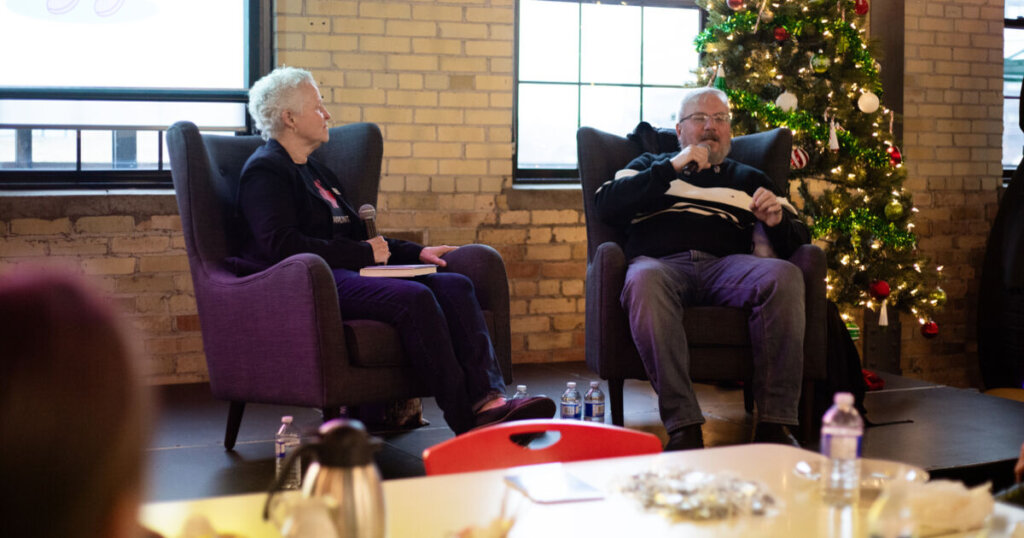Home » Eldon Sprickerhoff Reveals Startup Survival Strategies at Communitech Breakfast
Eldon Sprickerhoff Reveals Startup Survival Strategies at Communitech Breakfast

Eldon Sprickerhoff, the CIO and co-founder of eSentire, shared insights on startup survival at Communitech's Breakfast Series, using a unique analogy comparing defending a chicken coop to navigating the challenges of building a startup. Living in the countryside where he protects his wife’s chickens from various predators like coyotes and weasels, Sprickerhoff emphasizes that much like in the animal kingdom, in the startup world, numerous external forces are vying to undermine one’s success.
His recent book, “Committed: Startup Survival Tips and Uncommon Sense for First-Time Tech Founders,” underscores the necessity of a survival mindset amid the chaos and competition faced by founders. In a discussion with Communitech's Ellen Johnson, he pointed out that every founder must take on the role of "Chief Survival Officer," recognizing the need for continuous effort and resilience in the face of challenges. "You can’t be blissful… You need to hunker down and consider it war," he urged, explaining that success requires an ongoing fight against competitors, whether they are large corporations or emerging startups.
A key aspect of survival for founders, according to Sprickerhoff, is achieving product-market fit. He advocates for actively seeking feedback from "true believers" and iterating based on what potential users express. For eSentire, this involved recognizing a growing demand for proactive cybersecurity solutions and adjusting their strategies accordingly. He emphasized the importance of anticipating potential threats to the business's future and proactively addressing them to increase the chances of surviving in a competitive landscape.
Sprickerhoff assessed the grim odds of startup longevity, noting that less than a third survive beyond 10 years, likening it to "inverse Russian roulette." To thrive in such an environment, he advised that founders highlight their unique advantages while also pointing out competitors' weaknesses. He encourages entrepreneurs to “amplify” their differentiators to create barriers that competitors cannot easily overcome.
Authenticity plays a significant role in effective sales, he argued. Founders possess a unique, authentic narrative that can resonate with customers. Despite his personal aversion to sales, Sprickerhoff learned its importance as a founder, railing against the common inclination to delegate this role. He suggests utilizing personal stories when pitching to potential customers, positing that asking for someone's time to discuss the business is often met with a positive response.
On the topic of fundraising, he cautioned entrepreneurs not to rush the process, suggesting they brace themselves for the possibility that the initial round of funding may be the last they'll secure for a while. Given the recent difficulties in raising capital, he stresses the importance of careful consideration before giving away substantial portions of ownership too early.
As technology, particularly artificial intelligence (AI), becomes increasingly integrated into business solutions, Sprickerhoff foresees heightened competition, emphasizing the necessity for founders to clearly define and communicate their value propositions.
At the core of his message is the enrollment and action-oriented mentality that is essential for startup success. “Just go for it,” he advised. “Don’t be passive.” Sprickerhoff’s journey, marked by strategic insights and a survival-oriented mindset, illustrates a pragmatic and tenacious approach to entrepreneurship essential for today’s founders in the fast-evolving tech landscape.
Communitech
https://communitech.ca
"Communitech helps tech-driven companies start, grow and succeed. Communitech was founded in 1997 by a group of entrepreneurs committed to making Waterloo Region a global innovation leader. At the time it was crazy talk, but somehow this community managed to pull it off. Today, Communitech is a public-private innovation hub that supports a community of more than 1400 companies — from startups to scale-ups to large global players. Communitech helps tech companies start, grow and succeed in three distinct ways: - Communitech is a place – the center of gravity for entrepreneurs and innovators. A clubhouse for building cool shit and great companies. - Communitech delivers programs – helping companies at all stages with access to capital, customers and talent. We are here to help them grow and innovate. - Communitech partners in building a world-leading ecosystem – making sure we have all the ingredients (and the brand) to go from a small startup to a global giant."


